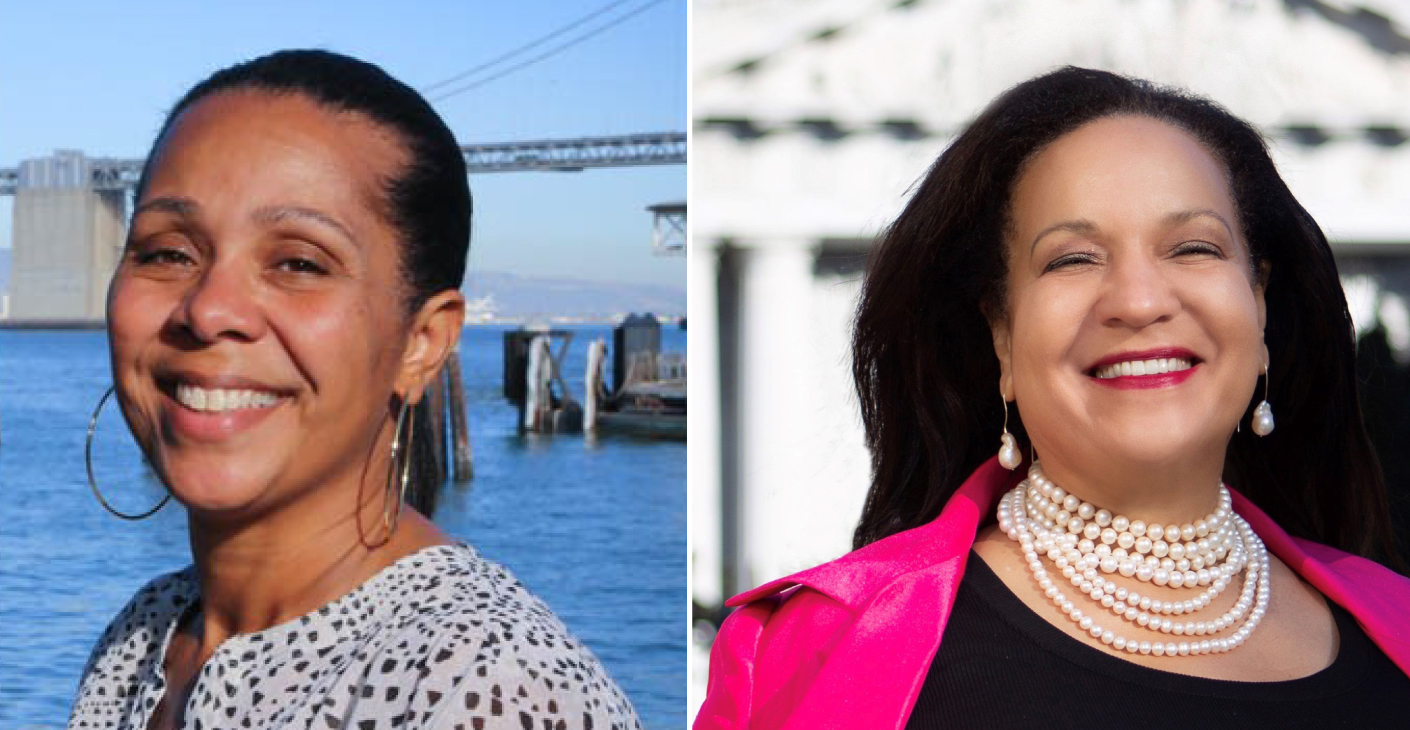A conversation about Black philanthropy with Executive Director Dr. Sheryl Evans Davis and Commissioner Karen Valentia Clopton, of the San Francisco Human Rights Commission (HRC), in celebration of Juneteenth.
How did you first get involved in philanthropy?
Dr. Sheryl Evans Davis: My family and our deeply rooted spirituality influenced my servant leadership from an early age.
Karen Valentia Clopton: Like Sheryl, I was introduced as a child to giving by my mother and grandmother through tithing and fundraising at Church and through service at Church, the Girl Scouts, and Jack and Jill of America.
How has your giving evolved since then?
SD: I am very focused on the health and well-being of the African American community because of systematic discrimination and racism.
KVC: I still support my church community. I have also centered my giving on initiatives that seek to expose and eradicate institutional racism in the legal profession, academia, art, media, healthcare, and housing.
What knowledge and skills do you bring to your giving?
SD: My background as an educator, activist, and community organizer has prepared me well to both draft and evaluate requests for grants and proposals.
KVC: As a Human Rights Commissioner, lawyer, and former judge, I bring a deep knowledge of the law, American history, legal analysis, and strategic planning.
What issues are you passionate about?
SD: I am passionate about fostering community and affirming belonging. I love to blend culture and the arts to celebrate and affirm, as Maya Angelou wrote – bringing the gifts my ancestors gave. Music, poetry, wisdom of the past connected to the hope of the future.
KVC: My main goal is to educate and advocate on behalf of humanity so that all people are treated with respect and dignity.
What do you look for in the organizations you support?
SD: I look at who is served, who is in leadership, what is the leadership style. Of course, I’m looking for true diversity and inclusion, not just lip service.
KVC: shared values resonate the most for me: accountability, excellence, integrity, open communication, transparency, and cultural competency.
Who do you consider to be role models for your giving?
SD: The Black community is an abiding role model for us – phenomenal women and men who gave their all, Harriet Tubman, or Dr. King’s mentor – Dr. Benjamin Mays – these folks demonstrate the reward and legacy of giving.
As we celebrate Juneteenth it’s important to remember that when whites forbade Blacks from using their public spaces, Black people gathered near rivers and lakes and eventually raised enough money to buy their own celebration sites, among them Emancipation Park in Houston and Booker T. Washington Park in Mexia.
KVC: I agree with Sheryl, Black philanthropy is deep and unrecognized despite the reality. According to How Women Lead:
- Black households give 25% more of their income annually than white households.
- Nearly two-thirds of African American households donate to organizations and causes, totaling $11 billion each year.
- Financial contributions from the Black community have been consistent for generations.
- The Black community is one the largest group of givers in the USA.
- African American donors (39.1%) also are almost twice as likely as white donors (21.7%) to say that they carefully monitor their social investments.
How has SFF supported your philanthropy?
SD: SFF and CEO Fred Blackwell have been very supportive of our efforts to uplift San Francisco’s Black community since the onset of the pandemic.
KVC: SFF made it easy for us to start the Black Wellness Fund and has provided flexible investment strategies for our grantmaking needs.
Tell us about an organization you are passionate about?
We are both passionate about MegaBlackSF. MegaBlackSF is focused on increasing the visibility of Black people in San Francisco and ensuring the Black community has access to resources to improve quality of life and decrease the disparities Black people face.
How and why did you first get involved with them?
KVC: As Director of the Human Rights Commission, Dr, Sheryl Davis convened over 25 different Black-led community-based organizations in March 2020 to address the needs of San Francisco’s Black community. Over 300 African American residents of San Francisco are currently engaged in MegaBlackSF initiatives, including the Reparations movement, education equity, police reform, and healthcare. We are stronger together and while we are not a monolith, we share common concerns and goals for a thriving San Francisco Black community.
How has your relationship with this organization been meaningful to you?
SD: As Karen mentioned, I was blessed to be the Convener, I view myself as a humble steward.
KVC: I’m very proud to have seeded the Black Wellness Fund and to serve on MegaBlackSF’s Grant Circle. This opportunity to help make an impact, be of service, and develop creative fundraising initiatives that inspire giving on every level across generations.
If you could solve one problem, what would it be?
SD: I would eliminate the achievement gap and the systemic failures that contribute to this inequity.
KVC: I want to eradicate racial disparities in disaster relief outcomes, whether fires, floods, the Pandemic, or environmental.
What are your short- and long-term goals for your philanthropy?
SD: My short-term goal is to help people suffering from the Pandemic and the long-term goal is to eliminate the causes of the racial disparities revealed by the pandemic.
KVC: My goal for this year is to grow the Black Wellness Fund so we can distribute grants to the most needy in our community. My long-range goal is to help influence others to contribute to securing true access, equity, and inclusion in all aspects of our lives, healthcare, environment, education, employment, and the arts.


